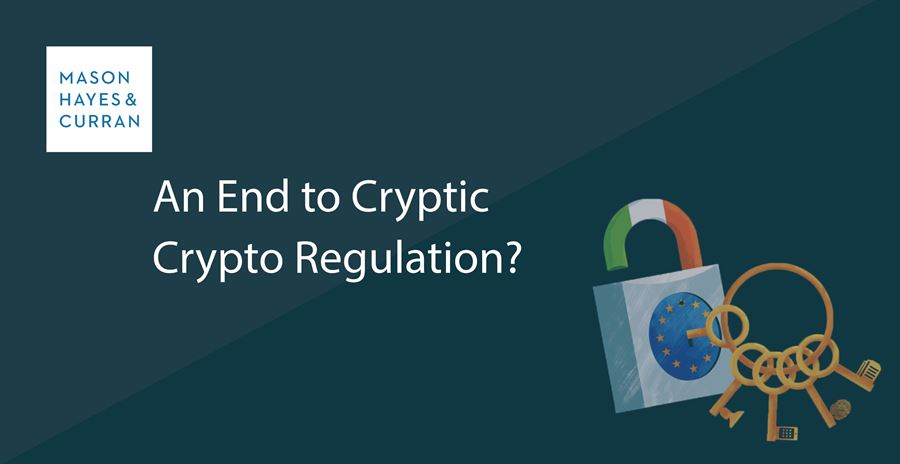An End to Cryptic Crypto Regulation?

Currently, there is no standalone regulatory regime that applies to cryptocurrencies in Ireland and the Central Bank does not view cryptocurrencies as legal tender.
While some crypto currencies qualify as financial instruments as defined in MiFID II and therefore fall in scope of regulation, to date, “vanilla” cryptocurrencies have fallen outside the scope of financial regulation at both national and European level. This means that such currencies are not subject to regulatory provisions relating to consumer and investor protection and market integrity.
The introduction of two measures will change the current status of cryptocurrencies.
-
The Criminal Justice (Money Laundering and Terrorist Financing) (Amendment) Bill 2020 (the “2020 Bill”)
The 2020 Bill is intended to transpose into Irish law, the requirements of the EU’s Fifth Anti-Money Laundering Directive (AMLD) which focuses on the gateways between fiat money (legal tender backed by a government) and cryptocurrencies. The 2020 Bill will bring previously unregulated virtual asset service providers and custodian wallet providers into the scope of Anti-Money-Laundering (AML) regulation.
Financial and credit institutions, amongst others, are required to comply with AML laws and obligations and are considered to be “Designated Persons” for the purposes of Irish AML legislation. The 2020 Bill extends the definition of Designated Persons to include virtual currency providers and associated online wallet providers for cryptocurrencies. This will require providers of exchange services between crypto and fiat currencies to adhere to AML obligations and know-your-customer requirements for the first time. Some of the larger virtual asset service and wallet providers have pro-actively adopted AML practices within their businesses for a number of years.
Speaking at the London City Week panel discussion on the Global Fight Against Financial Crime on 22 September 2020, Derville Rowland, Director General, Financial Conduct at the Central Bank, commented that the inclusion of “so-called virtual asset service providers, or VASPS within the scope of AML directives in line with the FATF standards is necessary and to be welcomed.”
-
European Commission Digital Finance Package
The advancements in proposed cryptocurrency regulation continue at a European level with the publication of the European Commission’s Digital Finance Package on 24 September 2020.
This package includes a Proposal for a Regulation of the European Parliament and of the Council on Markets in Crypto-assets and amending Directive (EU) 2019/1937 (Proposal) which would create a legislative framework for crypto-assets. Strict requirements for issuers of crypto-assets would apply, including a requirement for providers to apply for authorisation in order to provide services within the EU.
The Proposal applies to all crypto-assets not currently covered under existing financial services legislation and will establish uniform rules for issuers of such crypto-assets as well as for crypto-asset service providers. The definition of “crypto-asset” is broadly drafted and includes cryptocurrencies.
If the Proposal becomes law, crypto-asset service providers will be required to have a physical presence in the EU and will require authorisation from their relevant national competent authority. Such crypto-asset service providers will also be subject to:
-
Prudential requirements
-
Organisational requirements
-
Rules on safekeeping of clients’ funds
-
Rules on complaint handling procedures
-
Rules on conflicts of interests
Additional requirements will apply according to the type of service to be provided.
The European Commission is also proposing a clarification to the existing definition of ‘financial instruments’ under MiFID II. It is proposed that crypto-assets that are already subject to union legislation, that qualify as financial instruments as defined in MiFID II, will remain subject to existing EU legislation.
The expansion of AML regulations to virtual currency providers and associated online wallet providers for virtual currencies marks the first step towards the regulation of the provision and exchange of cryptocurrencies in Ireland.
The objective at a European level is to create legal certainty for crypto-assets within the EU through a sound regulatory framework. The overall aim of these proposals is to provide consumer and investor protection and to safeguard market integrity.
As the draft European legislation is only at proposal level, it may be a number of years before the regime becomes law; however, the European Commission’s Proposal is an important legislative milestone in the move to fully regulating crypto-assets.
However, virtual currency providers and online wallet providers in Ireland should now consider their AML obligations and put measures in place to comply with these in advance of the enactment of the 2020 Bill.
If you have any queries , please contact a member of our Financial Regulations Team.
The content of this article is provided for information purposes only and does not constitute legal or other advice.
Share this:


